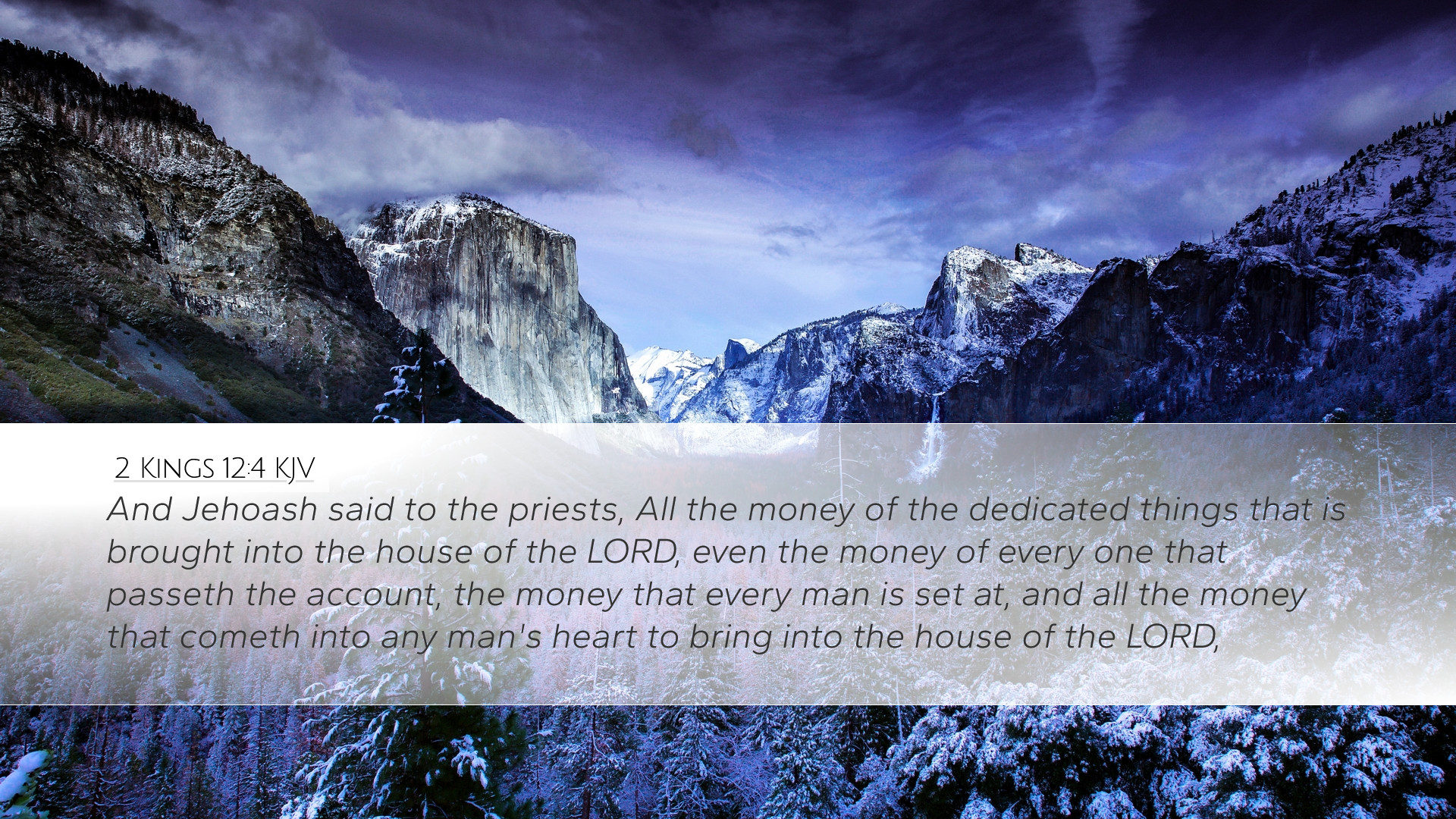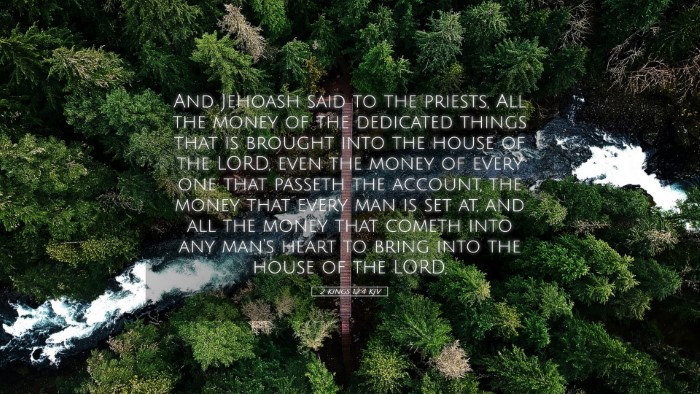Old Testament
Genesis Exodus Leviticus Numbers Deuteronomy Joshua Judges Ruth 1 Samuel 2 Samuel 1 Kings 2 Kings 1 Chronicles 2 Chronicles Ezra Nehemiah Esther Job Psalms Proverbs Ecclesiastes Song of Solomon Isaiah Jeremiah Lamentations Ezekiel Daniel Hosea Joel Amos Obadiah Jonah Micah Nahum Habakkuk Zephaniah Haggai Zechariah Malachi2 Kings 12:4
2 Kings 12:4 KJV
And Jehoash said to the priests, All the money of the dedicated things that is brought into the house of the LORD, even the money of every one that passeth the account, the money that every man is set at, and all the money that cometh into any man's heart to bring into the house of the LORD,
2 Kings 12:4 Bible Commentary
Commentary on 2 Kings 12:4
Verse Context: 2 Kings 12:4 states, "And Jehoash said to the priests, All the money of the dedicated things that is brought into the house of the Lord, even the money of every one that passeth the account, the money that every man is set at, and all the money that cometh into any man's heart to bring into the house of the Lord," This verse presents an important moment in the life of King Jehoash and the economic practices surrounding the Temple in Jerusalem.
Historical and Theological Context
This period, marked by political instability and idolatry in Israel, highlights the importance of proper worship and temple maintenance. Jehoash (also known as Joash), as king, was tasked with restoring true worship and ensuring that the Temple of the Lord was maintained properly after years of neglect.
The Temple's condition reflected the spiritual state of the nation, and under Jehoash's reign, there was a conscious effort to bring the nation back to a place of right worship. The financial practices mentioned in this verse reveal a structured approach to funding the Lord's work.
Insights from Public Domain Commentaries
-
Matthew Henry:
Henry emphasizes that Jehoash's initiative to gather funds for the Temple's repair illustrates a significant move towards spiritual restoration. He suggests that the emphasis on “dedicated things” reflects a commitment to the holiness of God’s house. This verse illustrates the principle of accountability in the use of resources dedicated to God, reminding believers that all contributions should be made with clear intent and purpose.
-
Albert Barnes:
Barnes notes that Jehoash's command to the priests played a crucial role in the financial governance of the Temple. He observes that the specific mention of “money” and contributions suggests an organized system to manage the offerings effectively. This establishes a precedent for future kings and leaders to be diligent in spiritual matters. It also highlights the importance of involving the clergy in financial affairs related to worship—a theme relevant for church governance today.
-
Adam Clarke:
Clarke points out the phrase “that cometh into any man's heart to bring” indicating voluntary offerings from the heart of the people. He stresses the significance of sincerity in giving—suggesting that God desires not just the act of giving, but the spirit behind it. Clarke also suggests that Jehoash’s strategy for funding repairs emphasizes a collective responsibility among the people, which is an essential aspect of ecclesiastical contributions.
Thematic Applications
This verse encourages several key themes that can be invaluable for pastors and theologians:
- Stewardship: The passage underscores the importance of wise financial management within the context of faith. Churches today can draw from Jehoash's example, ensuring that resources are utilized for the proper maintenance of worship and ministry.
- Collective Responsibility: The call to the community for contributions highlights the role of collective participation in church affairs, reminding congregants that everyone has a part to play in supporting the mission of the church.
- Voluntary Giving: The text encourages an approach to giving that is rooted in personal conviction rather than obligation. This principle is vital in teaching contemporary Christians about cheerful giving as emphasized in the New Testament (2 Corinthians 9:7).
- Spiritual Restoration: Just as Jehoash aimed to restore the Temple, believers are called to restore spiritual health within their communities. This may involve both physical and emotional contributions to help others grow in faith.
Conclusion
2 Kings 12:4 serves as an important reminder that proper worship involves not just the heart, but also the resources necessary to maintain that worship. Through the example of Jehoash, believers today can recognize the significance of dedicated efforts to honor God through their contributions and communal support.


